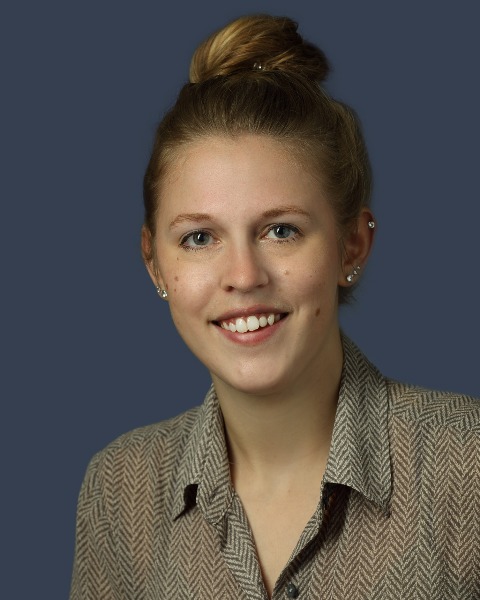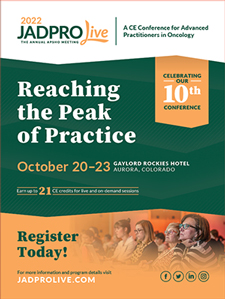Back


APSHO Patient Perspective Posters
JL1009P: Impact of the Cholangiocarcinoma Foundation’s Newly Diagnosed Program
Saturday, October 22, 2022
10:00 AM – 11:00 AM ET

Has Audio

Amelia G. Wagenknecht, BS (she/her/hers)
Research Advocate
Cholangiocarcinoma Foundation
Silver Spring, Maryland, United States
Poster Presenter(s)
Background:
Receiving a cancer diagnosis can be devastating—especially for rare cancers with few treatment options. A previous study showed that more than 50% of cholangiocarcinoma (CCA) patients experienced negative life impact from anxiety and depression related to their diagnosis1. A meta-analysis about patient education found that providing a pathway for patients to get accurate, timely information and supportive messages could reduce anxiety and depression and improve quality of life and treatment decision support. Thus, the Cholangiocarcinoma Foundation (CCF) established the newly diagnosed project to increase awareness and engage Cholangiocarcinoma patients and their caregivers early in their journey.
Interventions:
The CCF implemented an eight email series, including an initial survey sent to explore the areas of need and degree of awareness among participants. Once enrolled, participants received an additional six emails, including educational videos and printed materials providing information relevant to diagnosis, treatment, and the resources through CCF. Caregivers were given targeted information regarding wellness and self-care. Finally, the last email included a closing survey to evaluate awareness improvement among participants.
Participants were given the opportunity to sign up for a Care-Kit, which contained items to comfort the patient during treatment (i.e., warm socks). Additionally, they were offered an optional assignment for a one-on-one support call with a patient advocate and an opportunity to join the peer mentor program. Moreover, a physician information kit about the CCA and its treatment option was sent to their primary oncology providers if they are not CCA specialists.
Findings:
To date, 670 patients and 405 caregivers completed registration for the CCF Newly Diagnosed email series and received their Care-Kit. Participants were polled on their diagnosis site: intrahepatic CCA (n=512), perihilar CCA (n=64), distal CCA (n=54), or unsure (n=445). Participants were also asked how they found the foundation: Google (n=423), Facebook (n=301), family member or friend (n=181), referred by a physician (n=99), other (n=43), Instagram (n=12), YouTube (n=7), Twitter (n=7), and LinkedIn (n=2).
The first email of the series was opened by 72.1% (n=854) out of 1185 persons who received the email, while the last email was viewed by 48.4% (n= 507) out of 1048 persons who received the email. Among participants who opened the first email, 328 (38.4%) participated in the initial survey and confirmed a significant lack in receiving educational and emotional support. So far, only 17 (3.4%) out of 507 persons opened the last email and filled out the closing survey. However, the responses indicate that email series significantly impact participants' education.
Implications:
As of July 2022, the advocacy team has re-evaluated the delivery of the program and decided to reduce the number of emails to only four due to the patient/caregiver urgency to obtain information and reduce respondent workload. One-on-one conversations via Zoom call continue to be requested by patients/caregivers; this is an opportunity to research the benefits of the human-to-human connection in navigating this rare disease.
Receiving a cancer diagnosis can be devastating—especially for rare cancers with few treatment options. A previous study showed that more than 50% of cholangiocarcinoma (CCA) patients experienced negative life impact from anxiety and depression related to their diagnosis1. A meta-analysis about patient education found that providing a pathway for patients to get accurate, timely information and supportive messages could reduce anxiety and depression and improve quality of life and treatment decision support. Thus, the Cholangiocarcinoma Foundation (CCF) established the newly diagnosed project to increase awareness and engage Cholangiocarcinoma patients and their caregivers early in their journey.
Interventions:
The CCF implemented an eight email series, including an initial survey sent to explore the areas of need and degree of awareness among participants. Once enrolled, participants received an additional six emails, including educational videos and printed materials providing information relevant to diagnosis, treatment, and the resources through CCF. Caregivers were given targeted information regarding wellness and self-care. Finally, the last email included a closing survey to evaluate awareness improvement among participants.
Participants were given the opportunity to sign up for a Care-Kit, which contained items to comfort the patient during treatment (i.e., warm socks). Additionally, they were offered an optional assignment for a one-on-one support call with a patient advocate and an opportunity to join the peer mentor program. Moreover, a physician information kit about the CCA and its treatment option was sent to their primary oncology providers if they are not CCA specialists.
Findings:
To date, 670 patients and 405 caregivers completed registration for the CCF Newly Diagnosed email series and received their Care-Kit. Participants were polled on their diagnosis site: intrahepatic CCA (n=512), perihilar CCA (n=64), distal CCA (n=54), or unsure (n=445). Participants were also asked how they found the foundation: Google (n=423), Facebook (n=301), family member or friend (n=181), referred by a physician (n=99), other (n=43), Instagram (n=12), YouTube (n=7), Twitter (n=7), and LinkedIn (n=2).
The first email of the series was opened by 72.1% (n=854) out of 1185 persons who received the email, while the last email was viewed by 48.4% (n= 507) out of 1048 persons who received the email. Among participants who opened the first email, 328 (38.4%) participated in the initial survey and confirmed a significant lack in receiving educational and emotional support. So far, only 17 (3.4%) out of 507 persons opened the last email and filled out the closing survey. However, the responses indicate that email series significantly impact participants' education.
Implications:
As of July 2022, the advocacy team has re-evaluated the delivery of the program and decided to reduce the number of emails to only four due to the patient/caregiver urgency to obtain information and reduce respondent workload. One-on-one conversations via Zoom call continue to be requested by patients/caregivers; this is an opportunity to research the benefits of the human-to-human connection in navigating this rare disease.

